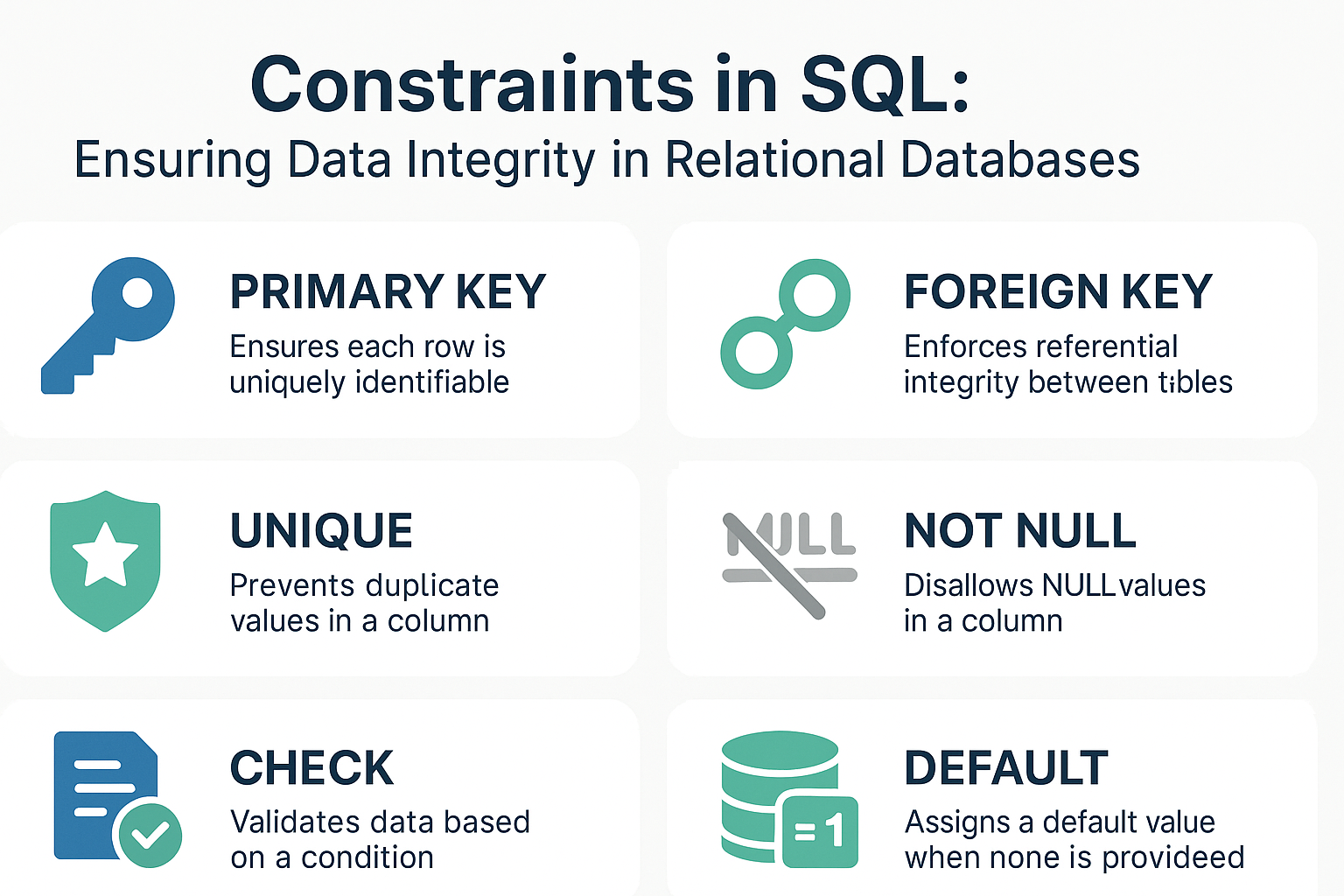Introduction
In SQL, constraints are rules applied to table columns to maintain data integrity and enforce business logic at the database level. They ensure that only valid data enters the system, reducing errors and improving consistency.
Why Constraints Matter
- Prevent invalid or duplicate data.
- Enforce relationships and business rules.
- Improve data quality without relying solely on application logic.
Real-world analogy:
Think of constraints as traffic signals. They don’t move vehicles but control their flow, ensuring safety and order. SQL constraints guide data flow in a similar way.
Core Types of SQL Constraints
1. PRIMARY KEY
Ensures each row is uniquely identifiable.
CREATE TABLE customers (
customer_id SERIAL PRIMARY KEY,
name VARCHAR(50)
);
2. FOREIGN KEY
Enforces referential integrity between tables.
CREATE TABLE orders (
order_id SERIAL PRIMARY KEY,
customer_id INT REFERENCES customers(customer_id)
);
3. UNIQUE
Prevents duplicate values in a column.
CREATE TABLE users (
email VARCHAR(100) UNIQUE
);
4. NOT NULL
Disallows NULL values in a column.
CREATE TABLE employees (
emp_id SERIAL PRIMARY KEY,
name VARCHAR(50) NOT NULL
);
5. CHECK
Validates data based on a condition.
CREATE TABLE products (
product_id SERIAL PRIMARY KEY,
price DECIMAL(10,2) CHECK (price > 0)
);
6. DEFAULT
Assigns a default value when none is provided.
CREATE TABLE accounts (
account_id SERIAL PRIMARY KEY,
status VARCHAR(10) DEFAULT 'ACTIVE'
);
Real-World Use Cases
- E-commerce: Ensure unique emails and valid prices.
- Banking: Enforce account relationships via foreign keys.
- Healthcare: Prevent NULL patient IDs in medical records.
Common Mistakes and Anti-Patterns
- Overusing constraints: Can slow down bulk inserts.
- Ignoring constraints: Leads to inconsistent data.
- Using application logic only: Risks bypassing data integrity rules.
Performance and Scalability Implications
- Constraints add validation overhead but improve data quality.
- Foreign keys ensure integrity but can impact write-heavy workloads.
- Indexes are automatically created for primary and unique constraints, improving read performance.
RDBMS Comparison
| Constraint | PostgreSQL | MySQL | Oracle |
|---|---|---|---|
| Primary Key | Fully supported | Fully supported | Fully supported |
| Foreign Key | Full enforcement | Can be deferred | Full enforcement |
| Check | Fully supported | Limited pre-8.0 | Fully supported |
| Default Values | Fully supported | Fully supported | Fully supported |
Best Practices & Optimization Tips
- Always define primary keys for every table.
- Use constraints to enforce critical business rules.
- Balance constraint usage with performance needs.
- Combine CHECK constraints with domain-specific validation.
- Document constraints for maintainability.
When to Use vs When to Avoid
Use Constraints When:
- You need strong data integrity at the database level.
- Business rules are critical and must be enforced everywhere.
Avoid Excessive Constraints When:
- Handling massive, high-speed writes where application-level validation suffices.
SQL Example: Combining Constraints
CREATE TABLE employees (
emp_id SERIAL PRIMARY KEY,
email VARCHAR(100) UNIQUE NOT NULL,
salary DECIMAL(10,2) CHECK (salary > 0),
join_date DATE DEFAULT CURRENT_DATE
);
Conclusion & Key Takeaways
SQL constraints are essential for building reliable databases. They ensure valid, consistent, and secure data while reducing application logic complexity.
Key Points:
- Constraints enforce rules at the database level.
- Use a mix of primary, foreign, unique, check, and default constraints.
- Balance performance with data integrity requirements.
FAQ
1. What are SQL constraints?
Rules applied to columns or tables to enforce data integrity.
2. Can I have multiple constraints on one column?
Yes, e.g., NOT NULL and UNIQUE on the same column.
3. What happens if I insert invalid data?
The database rejects the operation.
4. Are constraints the same in all RDBMS?
Core constraints are similar, but implementation details differ.
5. Do constraints affect performance?
They add overhead but improve data quality and consistency.
6. Can I disable constraints temporarily?
Yes, but it should be done cautiously during migrations.
7. What is a composite primary key?
A primary key that spans multiple columns.
8. Can a foreign key reference a unique key?
Yes, as long as the referenced column is unique.
9. Do CHECK constraints work in MySQL?
Fully supported in version 8.0 and later.
10. Are constraints required for all tables?
Not technically, but recommended for data integrity.
